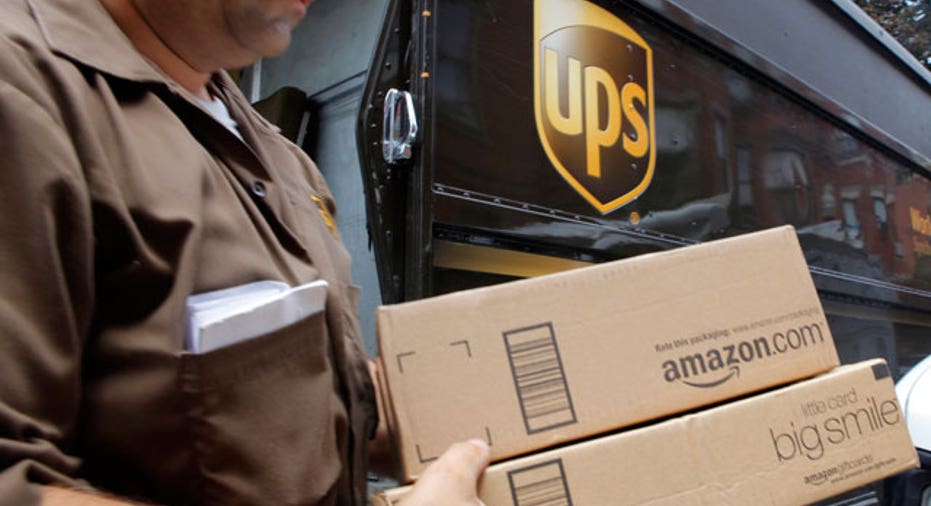UPS move pressures retailers

Retailers are contending with a new challenge as this year's holiday shopping season heats up: extra shipping fees during the busiest weeks.
United Parcel Service for the first time is tacking on a surcharge on packages shipped to homes around Black Friday and the week before Christmas, hoping to convince companies to send their orders outside those peak periods -- or to make more money from ones that must be delivered then.
The surcharge has prompted e-commerce retailers large and small to consider other delivery options, such as FedEx or the U.S. Postal Service, passing the additional costs to their customers, or delaying shipments to cheaper times.
Jeffrey Gornstein, president of home and garden site Comfort House, is one retailer who isn't using UPS as much this holiday season.
He declined to say how much he anticipates saving by switching some orders to other carriers, a change he began making in October. He saw the added fees as another challenge for smaller retailers. "Carriers implementing surcharges are punishing small merchants at the expense of larger e-commerce players," Mr. Gornstein said.
UPS expects the surcharge, which went into effect on Nov. 19 and lasts until Dec. 3, then returns mid-December, to smooth out the volume of packages it delivers during the holiday season. The Atlanta-based carrier expects it will deliver more than 30 million packages daily on 17 of the 21 delivery days (between Thanksgiving and Christmas in the U.S.
Last year UPS said exceeded that level on just 11 days over the same period. It sees the change this year as evidence that the surcharge is successfully evening out its volume.
Greg Brown, president of UPS's retail sector, said the company has been working with businesses to try to identify what orders placed during peak periods may not need to be rushed out the door. Many electronics, toys, sporting goods and clothing, for example, are Christmas gifts that don't need to be delivered right away. That can help retailers avoid bottlenecks, both in UPS's network and in their own warehouses.
"I don't think it's going to change buying patterns dramatically," said Mr. Brown. "What we're trying to help retailers do is shape demand a little bit."
Retailers are also attempting to adjust customers' expectations. Macy's Inc., which ships exclusively through UPS, is for the first time offering "no hurry shipping" this holiday season, giving all online shoppers the option of longer delivery time in exchange for "Macy's Money" that can be applied to future purchases.
Macy's tested the shipping option in some markets a year ago and more broadly during Mother's Day and Father's Day this year and said a "fair percentage" of customers signed up.
"More often than not, it is more of a 'want' basis instead of a 'need' basis," said Scott Prieto, Macy's executive vice president of logistics and operations.
Macy's will offer the delayed shipping option for several days around Black Friday, when Mr. Prieto said Macys.com orders can be 10 times what they are on a typical weekday, and in the week before Christmas.
The offering is similar to Amazon.com Inc.'s "no-rush shipping," in which shoppers can forego free two-day shipping in exchange for slower delivery and credits for videos, music or other items.
This fall Levi Strauss & Co. added "economy shipping," a cheaper and slower option than standard ground shipping that is aimed at online holiday shoppers getting an early start, said Marc Rosen, its president of global e-commerce. Economy shipping, which takes up to seven days, "allows us to work with transport providers to take advantage of lower shipping rates and pass that to consumers," said Mr. Rosen. "It gives us more flexibility."
UPS's surcharge tacks an additional 27 cents onto ground packages shipped during the peak period around Thanksgiving and Black Friday, ending Dec. 2. It doesn't apply to next-day or second-day shipments, which are already more expensive.
The week before Christmas, steeper fees go into effect, starting at 27 cents for ground orders and increasing to 97 cents for packages delivered in two and three days.
UPS generated an average $8.31 in revenue on each ground package shipped in the U.S. in the quarter ended Sept. 30. Moody's forecast that UPS could generate up to $200 million in revenue from the peak surcharges, which also include higher fees on oversize packages.
UPS has declined to say how much it expects to make from the extra charges. It has already set plans to raise them during next year's holiday season.
FedEx isn't adding peak-period surcharges, but like UPS, it is tacking on extra fees for oversize packages shipped during the holidays. Patrick Fitzgerald, FedEx's senior vice president of communications, said its peak-pricing strategy was set with small and medium-size businesses, as well as consumers shipping gifts, in mind.
The U.S. Postal Service, which hasn't added additional charges, expects to deliver more packages because of UPS's move and will be monitoring its network to see if there is a bump, Postmaster General Megan Brennan said.
Still, it isn't clear who will opt for slower shipping, even if it helps them cut costs. Radial, which provides e-commerce services to retailers such as Dick's Sporting Goods Inc. and Aéropostale Inc., asked clients over the summer whether they would like to offer the option over the holidays.
"We didn't have any takers," said Stefan Weitz, Radial's executive vice president of technology services. "There is still a real question as to whether or not consumers will accept the option, especially as Amazon continues to offer two-day [shipping] free."
--Sarah Nassauer contributed to this article.
Write to Paul Ziobro at Paul.Ziobro@wsj.com



















